
In recent years, director Wuershan has appeared in the public eye mostly in association with the mythological epic film "Investiture of the Gods Trilogy". Last summer, with the hit of "Investiture of the Gods Part I: Chaoge Fengyun" and the film's good performance in overseas screenings, the dual blessing of word of mouth and trophies has aroused the audience's expectations for the sequel in this summer.
Unexpectedly, on May 17, Wuershan posted an apology on his personal Weibo: "Due to the increased workload and difficulty of visual effects in post-production, "Fengshen II" will not be able to meet with everyone this summer." This not only disappointed the fans who were full of expectations, but also brought a chill to the entire schedule.
Fortunately, when the east is dark, the west is bright. There is no shortage of "bullets" in the list of films that Wuershandai will release. On June 13, before the opening of the 26th Shanghai International Film Festival, the Chinese style supernatural comic adaptation film "Under the Alien" directed by him was officially announced to be released nationwide on July 26, and it has launched a "cool and exciting" promotion, confident that "it has Qi to protect the body and sweep the class flavor."
The movie "Under the Alien" is adapted from the comic "Under the One" created by Mi Er. After the latter was launched in 2015, it has received more than 30 billion hits in 8 years, which is not an exaggeration to say that it is a hot cultural phenomenon. This attracted Wuershan's attention. He said that during the years of working on the entire "Investiture of the Gods" project, he has been conceiving a very similar project, "which is to turn the particularly original fantasy setting in the Investiture of the Gods into a story for contemporary young people." The text attributes of "Under the One" that interweave traditional cultural elements + the second dimension just coincide with this.
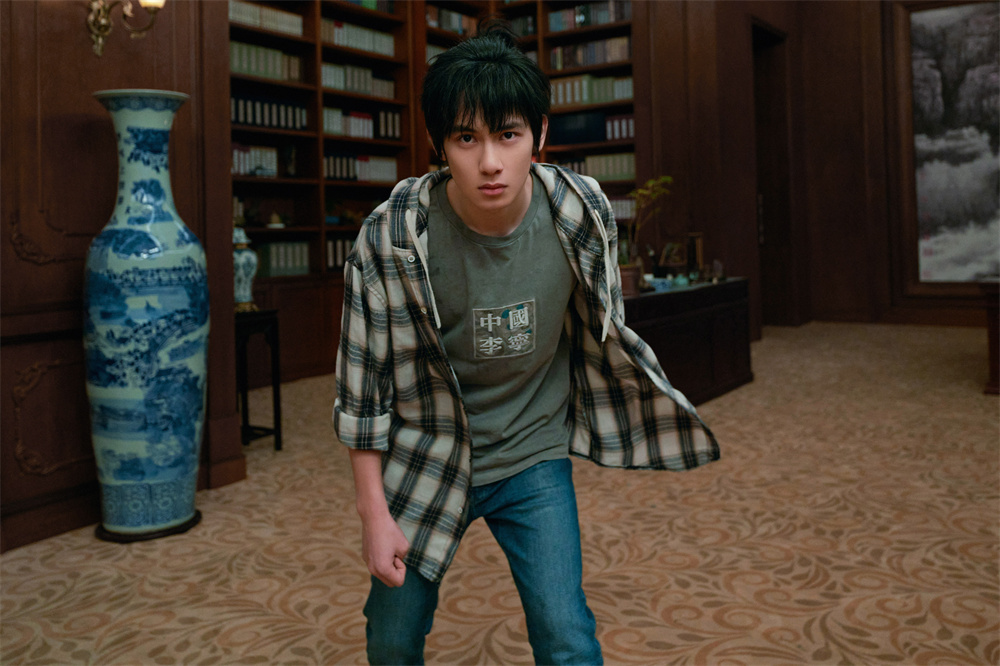
Hu Xianxu as Zhang Chulan
Undoubtedly, in the global film market after the new millennium, comic-based movies have become the mainstream of the market and a powerful box office weapon. However, compared with the superheroes of Marvel and DC on the big screen, domestic supernatural comic-based movies have been lacking, which is a pity. From this perspective, if the comic "Under One Person" is to be turned into a real-life movie, Wuershan, who has repeatedly carved out a path in different film genres in the past, should be the best candidate.
The premiere of the movie "Under Aliens" was held on the day of the solar term "Great Heat". At the lively "Summer of Aliens" party, no one expected that Wuershan would suddenly come up with an idea and sing one of his favorite songs from college days, Cui Jian's "Start Over Again" in public.
Recently in Beijing, he accepted an exclusive interview with a reporter from The Paper. This lone brave man who "does not want to live too realistically" detailed his pursuit and mental journey of becoming a director, and also explained the various efforts and explorations he made to shoot this film that is a domestic first in terms of genre.
In the end, his expression was similar to the one he gave last year when he asked about his expectations for the box office of The Investiture of the Gods: “Let’s start with the human world.” This time, he still looked calm and indifferent. “Peace and love, do my best, and leave no regrets.” Wuershan said.
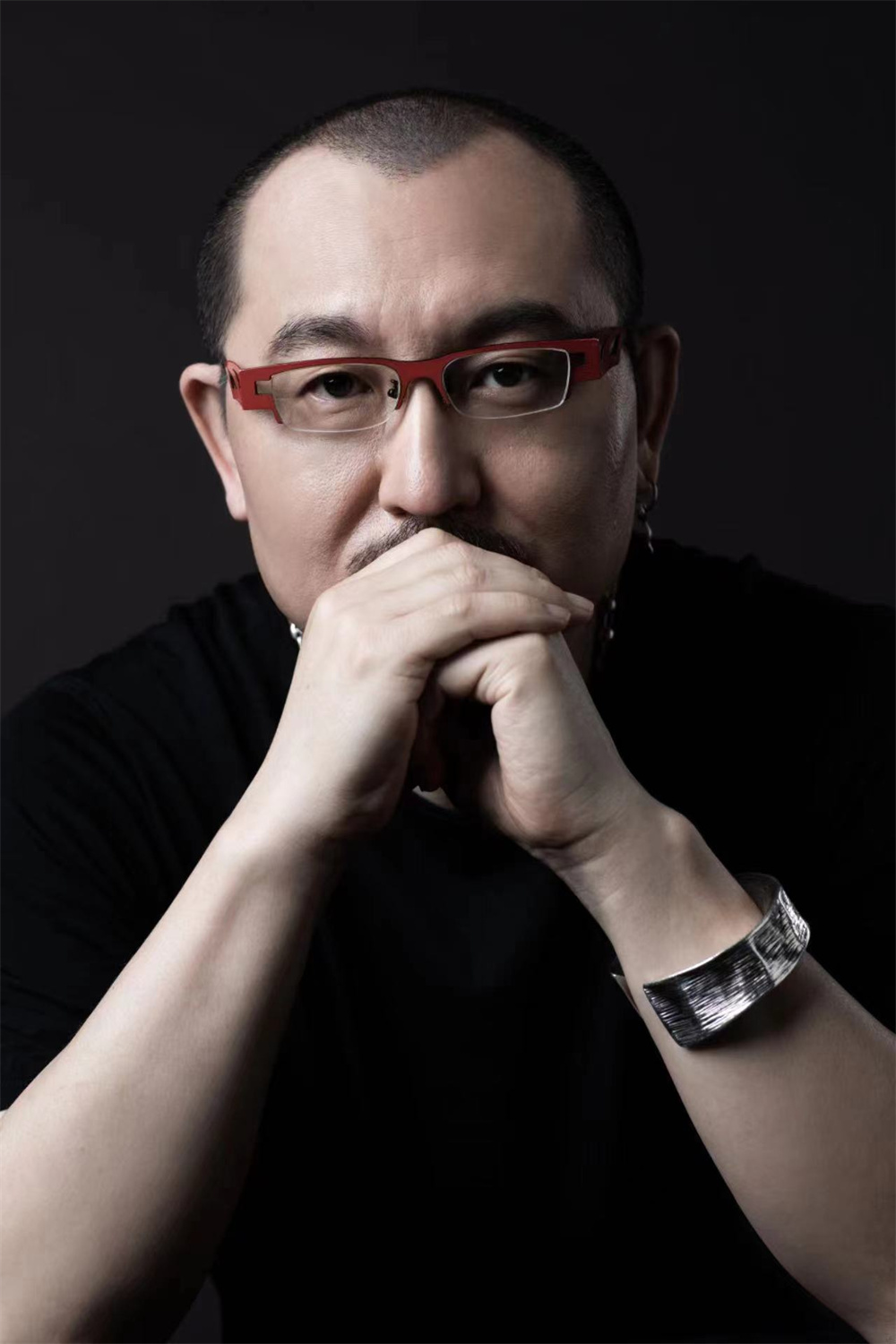
Director Wuershan
【dialogue】
In terms of cultural attributes, "the original comic "Under One Person" is really very Chinese"
The Paper : To be honest, many people were surprised to hear that you were going to direct the comic book adaptation film "Under the Alien". When I reviewed your film resume as a director, I found that your debut film "Blades of Smiley" was a pioneering martial arts film, and "Mojin: The Lost Legend" was adapted from online literature. It seems that in addition to the Wuershan in "Investiture of the Gods" and "Zheng He's Voyages to the West", there is another Wuershan who can be condescending and close to popular culture.
Wuershan : I am being too condescending. Actually, the novel Investiture of the Gods is also a "popular culture" of the Ming Dynasty. Take the movies Investiture of the Gods Part 1 and The Outcasts for example. They have several things in common.
First of all, I have always hoped to innovate the genre of Chinese films. The Investiture of the Gods Trilogy is a mythological epic, which we rarely touched before; The Outsiders is a supernatural comic-book adaptation movie, which has long been popular in the world film market. Marvel, DC and Japanese comic-book adaptation movies are numerous. Among the world's top ten best-selling movies, Marvel's Avengers 1, 3 and 4 account for three. Supernatural comic-book adaptation movies have long been part of the mainstream culture of young people worldwide, but this genre has not appeared in China. Including the "Zheng He Voyages to the West" that I will shoot later, it is a fantasy adventure type of sailing.
Secondly, I want to make a contemporary expression of traditional Chinese culture, and use new concepts and new technologies to re-process our existing cultural resources. Although the original comic "Under One Person" is more fashionable and modern, it also contains traditional Chinese philosophy, traditional Chinese medicine, martial arts, etc.
Once again, I hope to recommend young and talented actors to the entire industry and audiences. The first part of The Legend of the Gods has introduced a group of new forces to everyone. The main cast of The Untamed is also mostly young people, and their overall quality is also very outstanding. These points run through the main themes of my film creation in recent years. Looking back, in fact, my previous works have also more or less followed these propositions.
The Paper : The comic "Under One Person" was created in 2015, but the cultivation of Chinese comic soil was not in line with the world until the 1980s and 1990s. There is still a big difference in the history and environment of comic-adapted movies between China and foreign countries. What do you think about this?
Wuershan : In fact, China's comic-based movies started not too late. The Wanderings of Sanmao, released in 1949, was adapted from the four-frame comic of the same name by Mr. Zhang Leping. In the early 1990s, Shanghai director Zhang Jianya directed Sanmao's Military Life and Mr. Wang's Burning Desire, the latter of which was adapted from Mr. Ye Qianyu's comic Mr. Wang. In Hong Kong movies, there are actually quite a few such films after the 1990s, such as Storm Riders, Young and Dangerous, Initial D, and Kowloon Walled City. There are also different types of comic-based movies, such as those adapted from picture books. Director Han Yan has also directed Go Away! Tumor King and Animal World. It's just that in the past 20 years, comic-based movies like Hollywood's superhero type, whose stories are set in contemporary society, have been absent from the Chinese film market.
I have to admit that at a time when comic-based movies have become the mainstream style of entertainment movies around the world, there is still a lack of a Chinese-style series or brand. As for me, I loved watching cartoons produced by Shanghai Animation Film Studio when I was a child, and I also paid attention to the subsequent development of Chinese comics. The appearance of "Under One Person" made me re-understand contemporary Chinese comics. Since it was launched in 2015, the number of clicks on the comics has exceeded 30 billion in eight years, which is a very remarkable number and achievement. Since so many people have read this comic, why not introduce it to more moviegoers? I think this is a particularly meaningful thing.
The Paper : What is your evaluation of the cultural value of the comic book “Under One Person”?
Wuershan : In terms of cultural attributes, the original comic book "Under One Person" is really very Chinese, and the depth it has reached is what I have seen, and it is rarely achieved in Chinese comics before. It is not just easy to understand, but also fun, relaxed and humorous, but actually has depth and breadth.
If we look into the ideas behind each character here, for example, why it is called "Quanxing School", it comes from "Quanxing Baozhen, not burdening the body with things", which is the core of the thought of Yang Zhu School in the Spring and Autumn and Warring States Period. Another example is Zhang Chulan, whose way of life is "the best is like water, hiding in the city", which reflects the traditional Chinese philosophy of life. Including the real environment of these aliens in the comics, it is not out of touch with our understanding of current life. Feng Shayan of "Tianxiahui" is the eldest daughter of a listed company, and the organization that manages these aliens, "Nadutong", is a logistics company. This feeling is around us. It can be said that the original comics have both the deep connotation of traditional culture and the rich texture of our current life. This is very remarkable. From the appearance to the inside, it is extremely Chinese, and it comes extremely from our cultural traditions and real life.
The Paper : In your opinion, what is the biggest difficulty in adapting the comic "Under One Person" to the big screen?
Wuershan : The original comic has all the advantages I just mentioned. The character settings and the growth stories are also very exciting. I was very shocked when I read it. Its painting style is also very elegant and chic. When I first met Mr. Mi Er, I asked him where he learned to paint. I found out that he was actually a chef. Moreover, he not only paints, but also writes his own stories. He is really a genius.
The "Fengshen Trilogy" tells a complete story. The comic "Under One Person" is still being serialized, and we have currently planned a three-part series for the movie "Under Another Person". From comics to movies, it spans two media. Comics are first of all a frozen art, and then this work is serialized weekly, throwing a hook to readers every week, leaving suspense. Movies need to tell the audience a story with a beginning and an end within two hours of viewing time. What kind of narrative can be completed even in three "two hours"? This requires us to first pick out the core content and core characters of the original work, including what kind of character relationships to use as the main axis of the narrative line, which requires judgment as professional filmmakers. One similarity between "Under One Person" and "Fengshen Trilogy" is that the original works provide extremely rich stories and characters, and adaptation into movies requires trade-offs.
The Paper : Comic-based movies have an inherent audience that is familiar with the comic stories, but movies naturally target a wider audience. How do you tell the story well to audiences who know nothing about the comic plots? Talk about your approach.
Wuershan : In the first part of "Under the Aliens", the first thing we have to do is to establish the world view. Through the core characters such as Zhang Chulan and Feng Baobao, their relationship and their respective background stories, we bring the audience into this world. So the first part is more like a foundation. Without this foundation, it is difficult to extend the expression of the larger alien world in the future. The subsequent branch stories must be supported by a solid world view and core characters before they can unfold, so we must do it step by step. This is our creative idea for film adaptation.
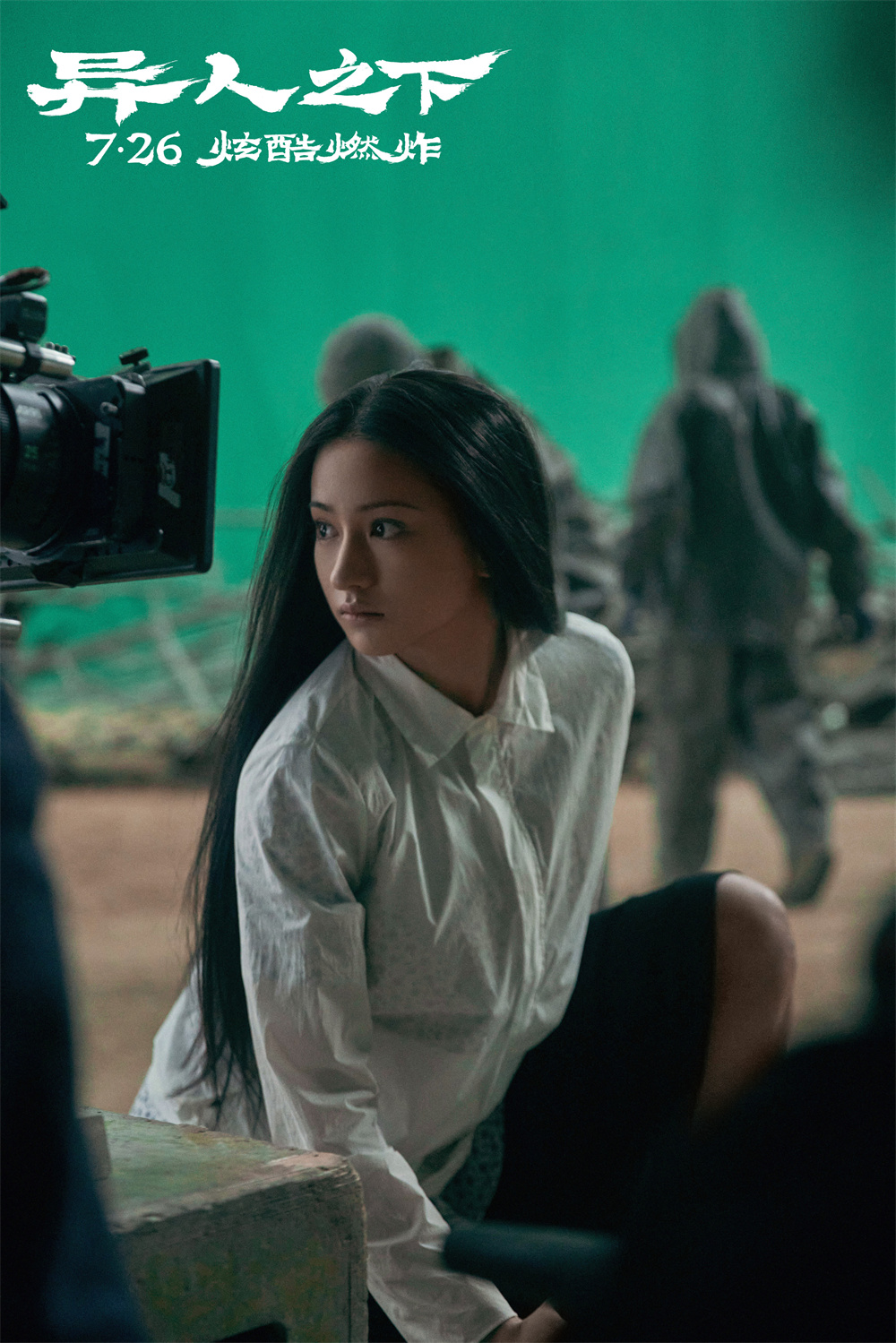
Li Wanda, who plays Feng Baobao, on the set
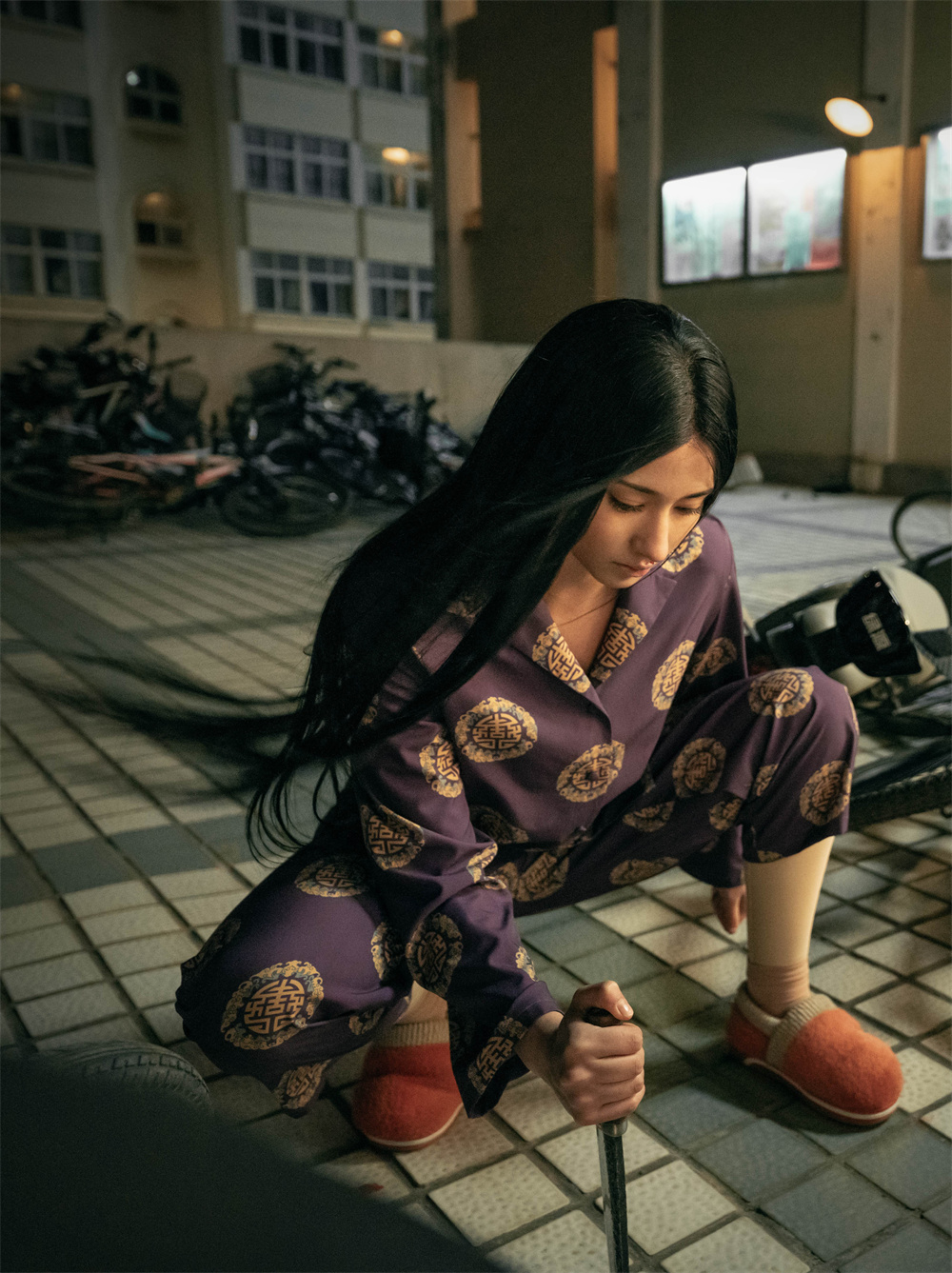
Li Wanda as Feng Baobao
Selecting actors, "Strive to be close to the image in the original comics"
The Paper : You just mentioned that comics and movies are two different media after all, and this time you are shooting a live-action movie adapted from a comic. How do you turn the comic experience into the language of film?
Wuershan : My previous works are actually adaptations of literary works. Painted Skin 2 is based on Strange Stories from a Chinese Studio, Mojin: The Lost Tomb is based on Ghost Blows Out the Light, and The Investiture of the Gods Trilogy is based on The Investiture of the Gods and The Story of King Wu's Conquest of Zhou. Compared with comic adaptations, the adaptation of literary works has an advantage for film and television creators. Although the former provides the story of the character, it does not directly provide the image of the character. What does the character look like? It is completely imagined by everyone's own knowledge and visual reserves, and everyone's imagination is not exactly the same. But in the process of readers reading comics, the character image and the story appear at the same time.
For readers who have read the comics, the image of the characters they see in the comics is also what they hope to see in the movie. This is very concrete. So this time, in the casting of "Under the Alien", it is very important that the actors we choose should be as close to the comic image as possible. As for the comics, we all know that its painting style is exaggerated and aesthetic. For fans of the original work, this style cannot be easily subverted.
The Paper : Speaking of actors, I noticed that the casting process for "Under the Stranger" is very similar to that for "Fengshen Trilogy". Can you give us a detailed introduction?
Wuershan : In the selection of actors, we strive to be close to the image in the original comics. For this purpose, we conducted a six-month audition of actors. Three actors for each role entered the training camp. After six months of continuous training, they had to learn acting and traditional martial arts. After three makeup tests, auditions and action assessments, we finally determined the current lineup of "aliens" in the movie.
In fact, the actors we selected can all be close to the comics through makeup. The reason for the training is mainly to focus on two points: the performance in comic movies is quite different from the general performance. The comics themselves have a relaxed and humorous tone, and there are many exaggerated expressions. How can real people perform these? You also have to find a balance. If you just copy the pictures of the comics, it will be weird as a coherent performance.
For a mythological epic like "The First Part of the Investiture of the Gods", the actors perform in a serious drama style, but this comic film will have a touch of light comedy. Only when these actors receive unified professional performance training and have tacit cooperation with each other can they form a unified performance tone. Everyone does not handle the performance according to the state of life, but has to have a highly stylized and formal performance style corresponding to the role. This is our focus in this performance training.
In addition, there are a lot of martial arts duel action scenes in this play. We chose traditional Chinese martial arts as the basis for the action in the whole play, and the actors had to undergo long-term martial arts training. Traditional martial arts are basically virgin martial arts, and the actors started from scratch. They need to work harder to achieve the beauty of the movements of martial artists.
Based on these requirements, we held a training camp for 6 months. The morning performance class was mainly about liberating nature, opening up oneself, and finding the possibility of performance, and then everyone kept rehearsing. The martial arts class in the afternoon, 4 hours of traditional martial arts training every day, allowed them to master the basic routines of traditional martial arts in the shortest possible time, and at the same time practice the stylized signature moves of the characters designed by the action director, so that they can present very formal and beautiful action scenes in the subsequent actual shooting. This time, our requirements for the actors can be said to be very comprehensive, from image to performance style to action ability, these three aspects are very important.
The Paper : In both the comics and the movie, Zhang Chulan is a core character. How did actor Hu Xianxu stand out?
Wuershan : There were many actors who auditioned for Zhang Chulan this time, and Xiao Hu was determined after many interviews. I think he was able to get this role because he has several important characteristics. First of all, he is very close to the character's age. Zhang Chulan in the story is a college student. When Xiao Hu came to audition, he was also between 20 and 21 years old. In addition, Xiao Hu is from Tianjin. As a child star in the past, he has also played many comedic roles. There is a saying that "Beijing oil, Wei mouth", which talks about the language talent of Tianjin people. He also has this cheerful and lively sense of humor. One of the characteristics of Zhang Chulan in this play is that he is eloquent and has a particularly strong ability to express himself in language. Another thing is that Xiao Hu is also a loyal fan of the original comics. His understanding of the world view and each character in it is very accurate and thorough.
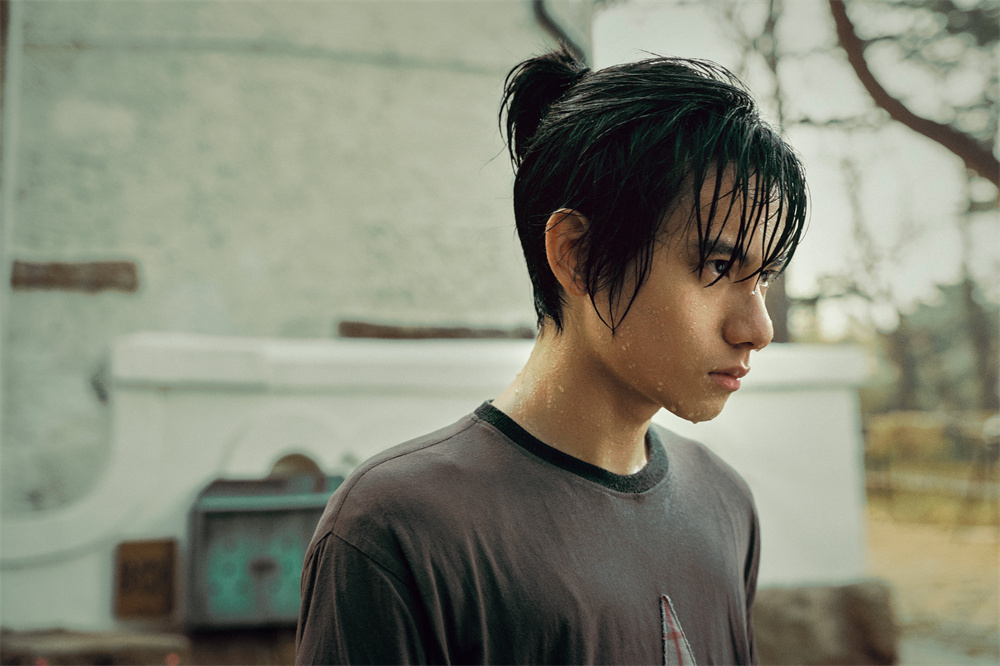
Hu Xianxu as Zhang Chulan
Of course, boys will be a little reserved and shy when they are 20 years old. This time, in addition to the acting class, I also assigned Xiao Hu a separate lesson. Every day after dinner at the training camp, I asked him to give a 10-minute talk show in the restaurant. No matter if there is an audience or not, no matter who the audience is, he will stand there and perform to see how many audiences he can win in the end. He continued to do this for nearly two months and completely opened himself up.
Another thing is that he had never performed an action scene before, and in the film there are many duels between Zhang Chulan and Zhang Lingyu and others. This time he spent a lot of time practicing Bajiquan and Baguazhang, and worked very hard, and finally completed the wonderful portrayal of the character.
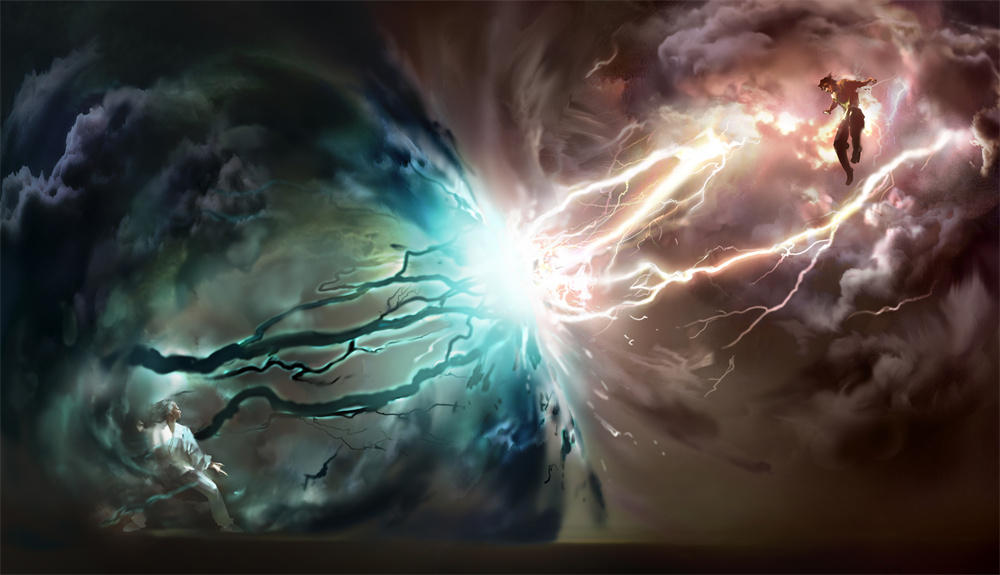
Concept design of "Under the Alien", Zhang Chulan and Zhang Lingyu's Yin-Yang Five Thunder Showdown
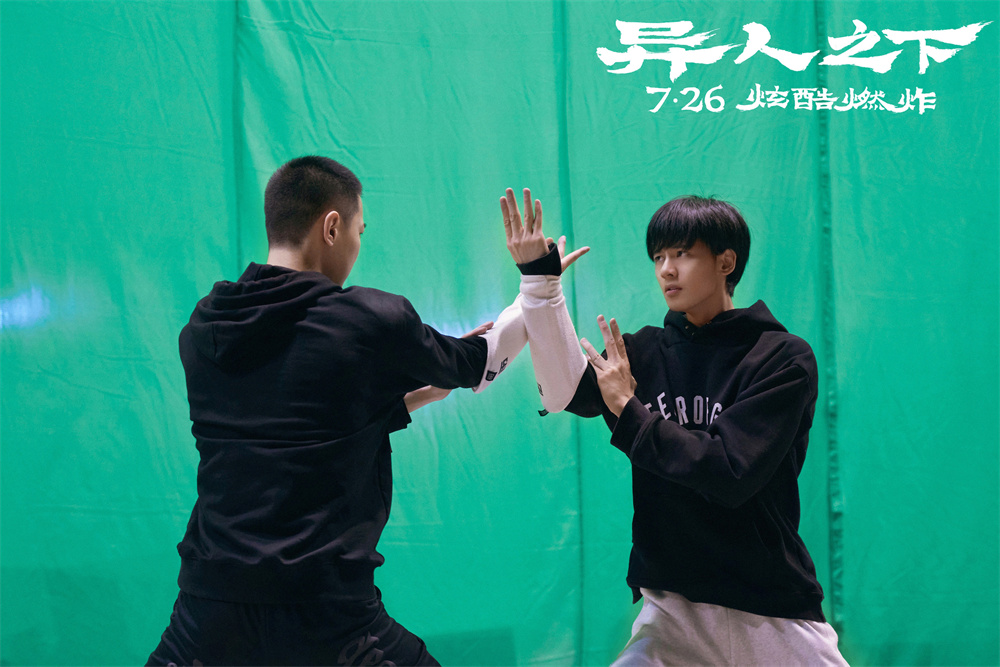
Hu Xianxu practices fighting scenes
The Paper : In addition to young talents, there are also many veteran actors joining the film. Among them, the host Liu Chunyan is the "golden beetle" of several generations on the Chinese screen. How did you invite her to come out of retirement?
Wuershan : According to the characteristics of the character Dou Mei, we wanted to find an actor who was particularly charming in voice and could capture people's hearts with her voice. When we thought of Teacher Liu Chunyan, it was a surprise. I invited her. At first, she said that she had never read the comics and had never acted in a movie before. Later, under our strong invitation, Teacher Liu's daughter happened to be a fan of the comic "Under One Person", and she tried her best to persuade her mother to give it a try. This also shows how popular this comic is among young people. Similarly, there is Teacher Chen Peter, who is a godfather of pop music. He is 81 years old this year. He was also moved by the comics and acted in a movie for the first time, playing the role of Grandpa Xu Xiang. So I think the charm of the original work is really infinite.
The Paper : The word "qi" (qi) that the aliens in "Under the Aliens" practice is unfamiliar to many people. What do you think of the inclusion of traditional culture, traditional martial arts, and Chinese medicine in the film?
Wuershan : "Qi" is a key concept in the entire traditional Chinese culture. In modern terms, I think it is the energy of life. This energy is hidden in all living things in the world. The so-called "aliens" are those who can sense and use this energy. The setting of this concept in the comics combines traditional culture and has its own originality, providing a matching theoretical system for Chinese-style superpower movies. Moreover, this theory is completely different from the setting methods of those Hollywood superpower movies, which I think is a very genius stroke.
These strange people in the movie practice their own "Qi" into different skills. How to present it visually? We marked the "Qi" of each strange person with different colors, and they also appeared in different forms. For example, Xia He's Prajna Palm is a pink lotus shape; Dou Mei's intestinal poison smoke is a purple big hand after a gentle hug. I think these visual expressions are what movies are good at, and we need to imagine boldly. The audience can intuitively distinguish the differences in skills and feel the originality of the movie.
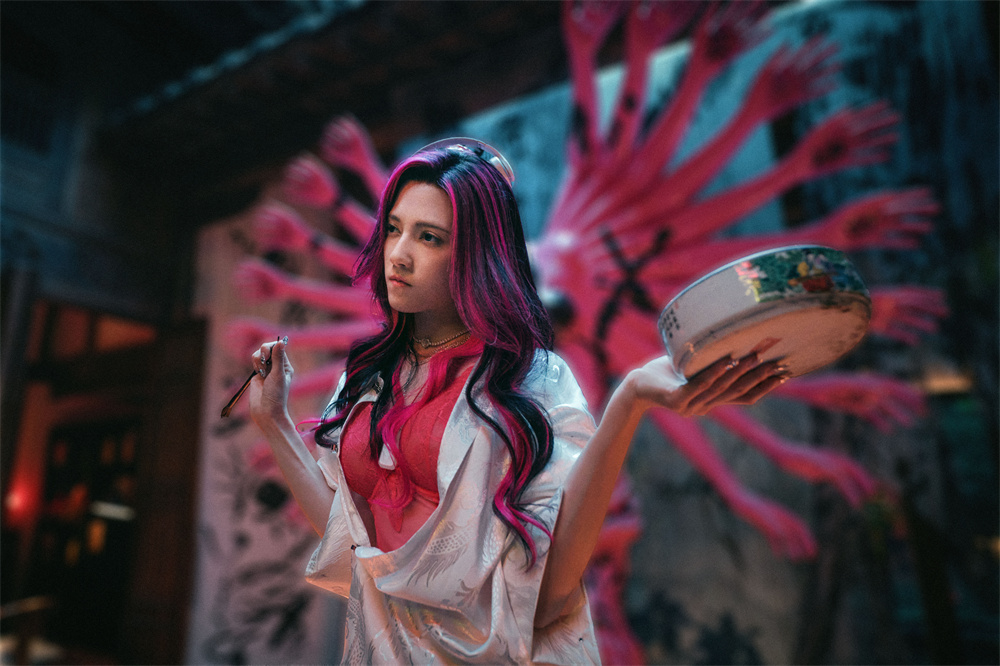
Na Ran as Xia He
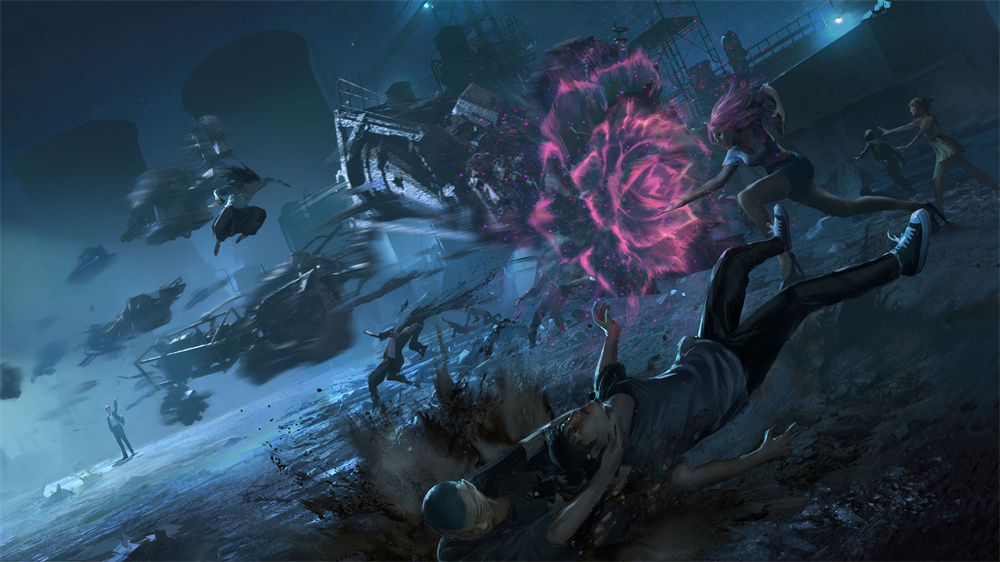
Concept design of "Under the Alien", Xia He's Prajna Palm
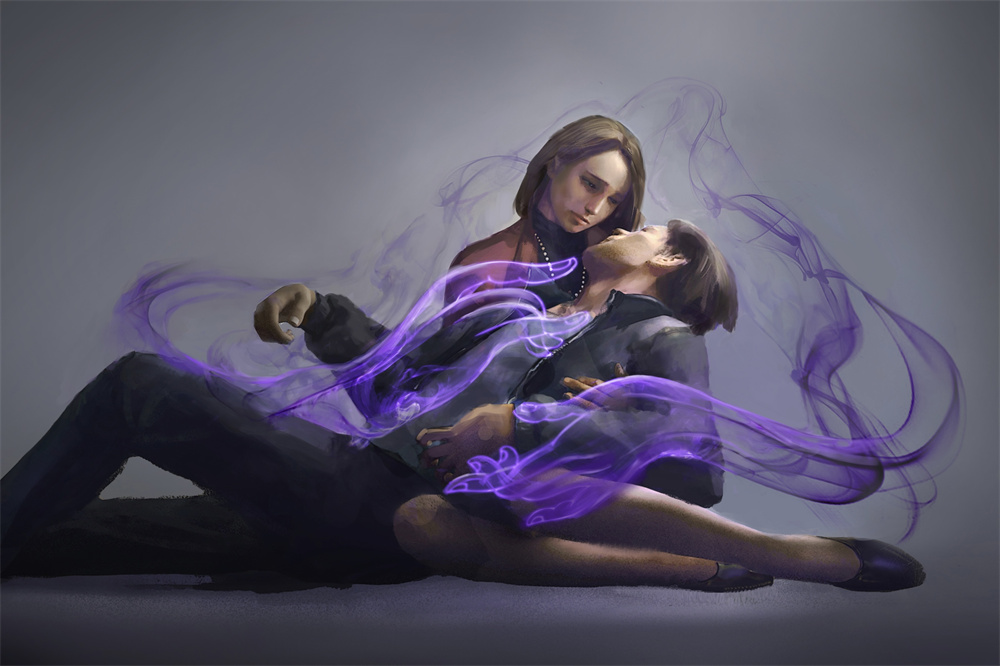
Concept art of "Under the Alien", Dou Mei's intestinal poisonous smoke
Another example is the golden light technique that Zhang Chulan, the heir of the "Nadutong" school, and Zhang Lingyu, the heir of the "Tianyimen" school, are good at. When using it, there are corresponding hand gestures. Each of these hand gestures has a specific meaning in traditional culture, including the words behind the spells they recite. During the operation, the acupuncture points of the character's body will light up first, and the "Qi" will flow through different acupuncture points, and finally be collected in the Yintang acupoint, and then the whole body will produce the effect of golden light protecting the body. Similar presentations can be traced back and observed in traditional culture, Chinese medicine meridians, and Yuanqi theory. So I think that making this movie is a very good opportunity. Chinese traditional culture is very cool and unique to us. As long as we find new ways of telling and presenting, it will surely resonate and echo at the moment.
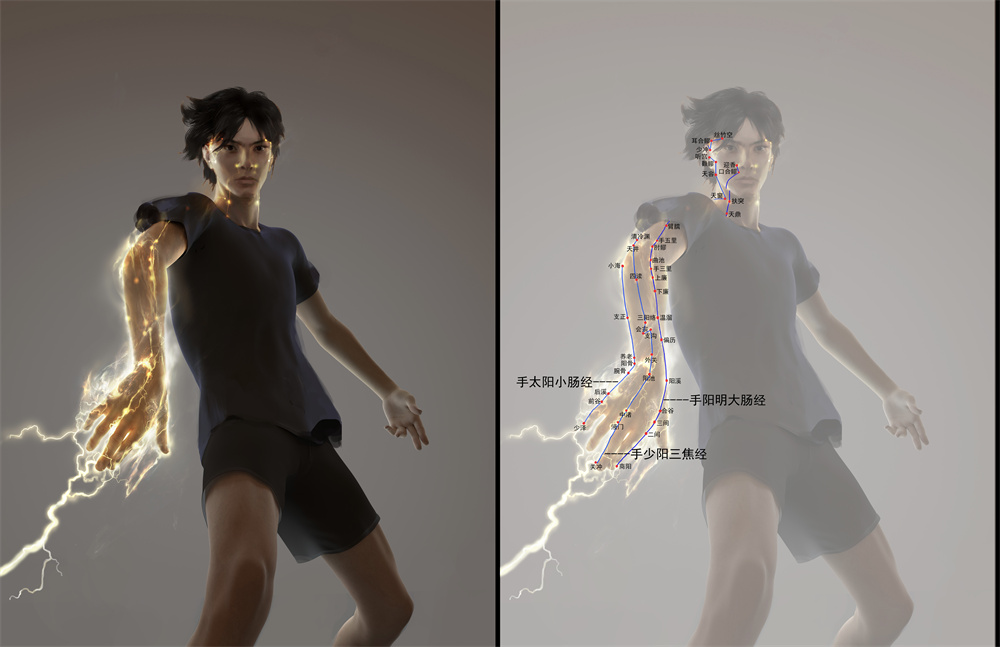
Concept design of "Under the Alien", Zhang Chulan's hand three yang meridians surface acupuncture points
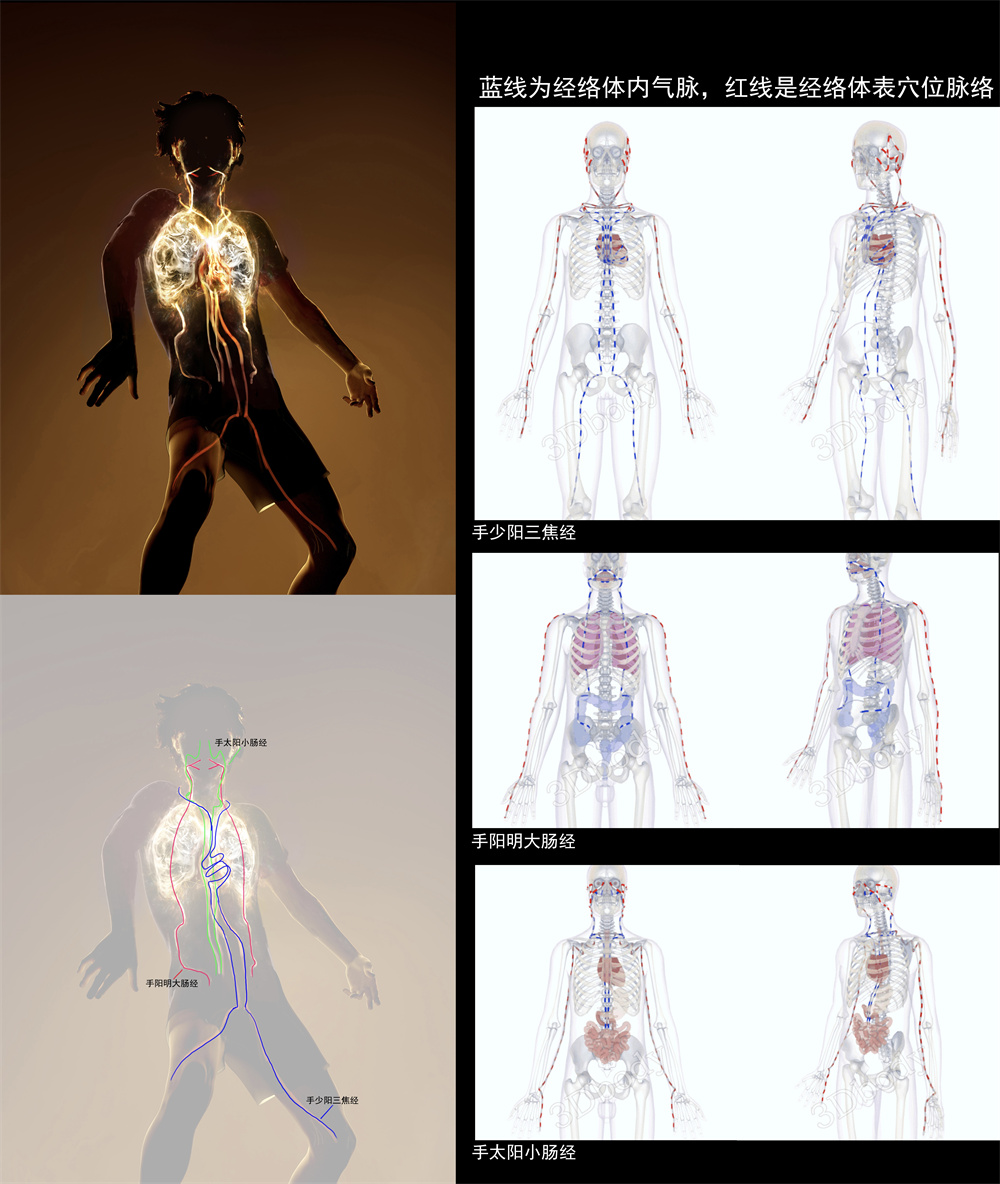
Concept design of "Under the Alien", the internal Qi channels of Zhang Chulan's three Yang meridians
Competing with Marvel? "It's a coincidence, but also a historic encounter"
The Paper : This time, the film uses a combination of real-life animation and artificial intelligence to create a new film. Can you talk about the aesthetic purpose and technical difficulties of this part?
Wuershan : The live-action animation segment lasts for 18 minutes. It appears in the part where the main characters recall the past, and it also expresses the unified visual effect of the memories. Live-action animation is a traditional animation production process. We shoot the live-action performance once, and the video is 24 frames per second. We break it down into frames, and then turn it into a hand-drawn comic style frame by frame, and then connect it to form an animation effect. This can distinguish this part of the content from the timeline of the real part of the film, and it is also a tribute to the original two-dimensional comics.
The Paper : In the film, Liu Yanyan is a master of the Xiangxi puppeteer school. When she appears in the background music, there is a song called "Ma Ma Du Du Qi". I later checked and found that it was adapted from a modern song of Changde Sizhu. The Chongqing folk song "Huang Yang Ban Tan" in the film also feels like a new version of an old song. I know you play in a band yourself. How do you define the overall style of the soundtrack in this film?
Wuershan : The collage principle is one of the hallmarks of postmodern art. In works, regardless of content, material, or expression, available elements are juxtaposed, rising from form to concept. This was reflected in many artistic practices in the past 20th century, especially in the second half of the painting, film, and other art practices. Comics themselves are a culture that highly mixes various popular elements. This time in "Under the Alien", I especially hope to try a new relationship between sound and picture, making the music part feel mixed and collaged, making it sound like a DJ playing discs, and each character has its own background music, which can tell its story through music, and then show the character's personality.

Lan Xiya as Liu Yanyan
Throughout the film, we used about 23 copyrighted music pieces of different styles. There are folk songs like the one you just mentioned, symphonies, the ancient song "General's Order", and various pop music, including hip hop, R&B, heavy metal rock, and all kinds of music styles are mixed in. It presents a rich auditory experience and also allows music to participate in the narrative.
"Ma Ma Du Du Qi" is a song I accidentally heard one day by the Si Si and Fan folk band. Liu Yanyan in the film is from the "Xiangxi Puppet Master" school, and the song is also sung in Hunan dialect, which is related to the character. "Huang Yang Ban Pole" appeared in the original comic. There are two popular folk songs in Sichuan. Everyone is familiar with "The Sun Comes Out and I'm Happy", but the style of "Huang Yang Ban Pole" is actually more gentle and affectionate. We used it to recall the family affection between Feng Baobao and Xu Xiang's family. This time, the musician Mr. Chen Peter not only played the role of Xu Xiang, but also adapted the style of the song. He and Li Wanda sang it together, which sounded more moving.
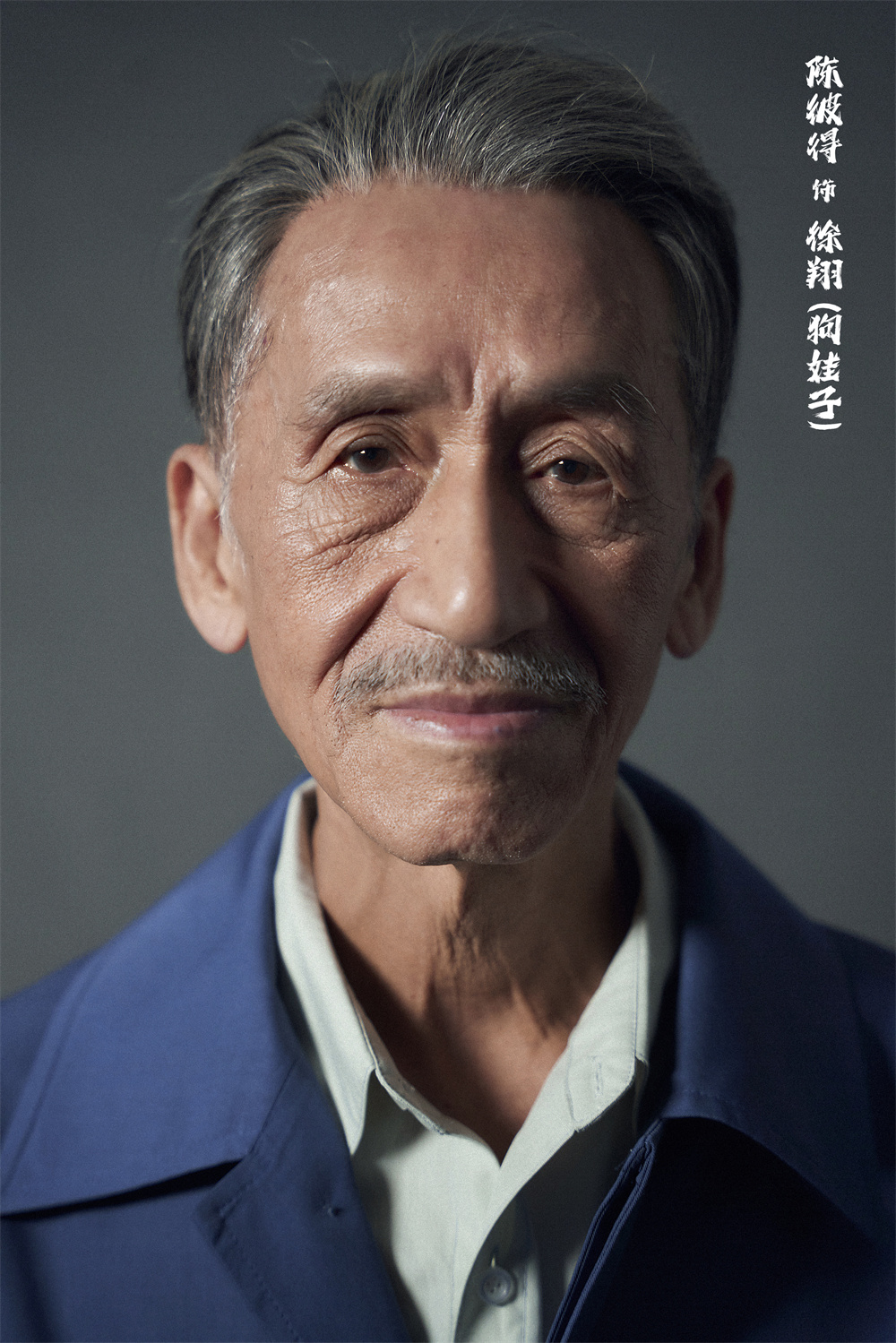
Peter Chen as Xu Xiang (Dog Boy)
The Paper : If I remember correctly, the end credits of the movie were displayed in the form of bullet screens. What do you think of the current bullet screen culture and its use in the end credits of the movie?
Wuershan : In this era of visual culture, I certainly hope that this film can also show rich visual elements. For example, the opening of this film is a special title made by visual artist Liu Di, using a CG animation to introduce the world view of the whole story. The whole film also strives to pursue a comic aesthetic.
The barrage subtitles you mentioned are an idea that I came up with. Firstly, the main story of the film has just ended at this moment, and the audience will feel unsatisfied and hope to get some new information. So I said, why not turn the subtitle introduction into the form of barrage subtitles and display them on the big screen. This way, it is like the instant feedback that the audience gets when watching movies on their mobile phones, and it also continues the visual innovation theme of the entire film.
The Paper : "Under Humans" and Marvel's "Deadpool vs. Wolverine" were released in mainland China on the same day. Doesn't this seem like a competition?
Wuershan : This is a coincidence, and it is a historical encounter. I personally like Marvel's "Deadpool" and DC's "The Suicide Squad". I think the so-called "competition" is just a way of saying it. The fans of these two movies may overlap to a large extent. If everyone goes to watch the movies, this summer season will be even more lively.
Behind comics and comic-adapted movies, what is mainly reflected is the imagination of various countries and nations. You can also understand "The Investiture of the Gods" as the imagination and story of superpowers of the people in the Ming Dynasty 500 years ago. It's just that in contemporary Chinese comic creations, there may be relatively few Chinese-style supernatural works like "Under One Person", or we may have ignored its existence in the past.
The emergence of the comic book "Under One Person" has announced that our creativity in this area is very strong, and many readers also love and recognize such creations. In terms of the creation of comic-adapted movies, on the one hand, as filmmakers, we are "waiting for the rice to cook."
In addition, we still had some shortcomings in film presentation technology. Through our catch-up this time, we have actually found the corresponding creative methods, allowing such works to be shown on the big screen. It is undoubtedly a good thing that audiences can see a richer variety of Chinese film types in theaters.
The Paper : What do you think about the similarities and differences in the development paths and cultural characteristics of comic-based movies in China and Hollywood?
Wuershan : If we use American comics like Marvel and DC as an analogy, the logic behind the superheroes in American comics, these superheroes with superpowers, is completely different from that in China. I have summarized four typical ways for them to generate superpowers.
The first is the side effect of scientific experiments, such as Spider-Man and the Hulk; the second is life from outer galaxies landing on Earth, a typical example is Superman, he is an orphan of Krypton. What is alien life like? No one has seen it so far, and it can be endowed with various superpowers through imagination; the third is from mythology, such as Thor and Aquaman, they have their own Western mythology to rely on; the fourth is the most familiar to everyone, Batman and Iron Man, just like Ben Affleck’s line, "My superpower is money." Through strong financial resources, relying on high-tech inventions to arm themselves with superpowers.
But the way Chinese traditional superpowers are generated is completely different from that in American comics. It basically comes from: first, inheritance, the inheritance of family and sect; second, from practice, obtaining stronger superpowers through self-cultivation. This way of thinking itself is very Chinese. The West is more inclined to science and the way superpowers are set in their cultural background is completely different from the superpower setting in our Chinese culture. In the movie "Under the Alien", we also emphasize and show Chinese superpowers, how they are generated and how they are upgraded.


